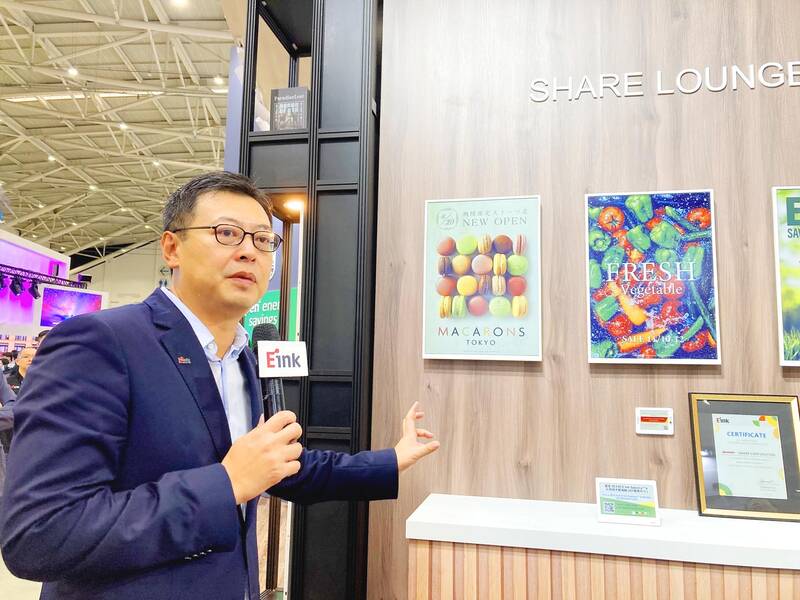E Ink Holdings Inc (元太科技), the world’s largest e-paper display supplier, yesterday said business is recovering gradually from an inventory correction cycle thanks to rapid and smooth technology upgrades in using new color e-paper displays on electronic readers and electronic shelf labels (ESLs).
The company said most customers are expected to level off extra older-generation color e-paper displays used in ESLs this quarter, resulting in a pickup in the third quarter. What is more encouraging is that a large retailer in North America has started replacing paper labels with ESLs, joining its European and Chinese peers.
The company expects new four color e-paper displays used in ESLs would account for about 90 percent, from 80 percent, of total ESL shipments.

Photo: Lisa Wang, Taipei Times
“We believe the first quarter is the lowest point. Our revenue in the second quarter will be better than the first quarter,” E Ink chairman Johnson Lee (李政昊) told media on the sideline of the Touch Taiwan display show in Taipei yesterday.
The main growth drivers this year would be electronic readers and electronic notebooks due to the display upgrade, Lee said.
“Customers said sales of their electronic readers with color displays are much better than they had expected,” Lee said, adding that the company’s equipment is fully utilized.
The company believes large e-paper displays would be the next growth driver, Lee said. The 32-inch cooler e-paper displays demonstrated equally good color performance compared with paper prints and should be a good replacement for paper posters, he said.
E Ink said that its new larger e-paper displays for public displays are to enter volume production early next year, after a new factory in Hsinchu starts operations at the end of this year.
Flat-panel makers AUO Corp (友達) and Innolux Corp (群創) also expect a gradual recovery starting in the second half of this year, backed by rising demand for panels used in large TVs and new artificial intelligence (AI) PCs.
AUO said demand for TV panels is picking up, indicating that the display industry has hit its bottom, after suffering the most in 2022 and last year.
The company witnessed a pickup in demand for 65-inch TV panels ahead of the Paris Olympics and UEFA Euro 2024, which are to take place in second and third quarters, AUO said.
“The display industry has weathered through the worst period in 2022 and 2023. The industry has returned to the healthy track,” AUO chairman Paul Peng (彭双浪) said. “We expect the introduction of AI PCs in the second half of this year to bring strong demand.”
The price of 65-inch TV panels are expected to rise at the fastest rate of 2.9 percent sequentially to about US$176 per unit this month, compared with price increases between 1.6 and 2.8 percent estimated for for 55-inch, 43-inch and 22-inch TV panels, price information provided by market researcher TrendForce Corp (集邦科技) showed.

Real estate agent and property developer JSL Construction & Development Co (愛山林) led the average compensation rankings among companies listed on the Taiwan Stock Exchange (TWSE) last year, while contract chipmaker Taiwan Semiconductor Manufacturing Co (TSMC, 台積電) finished 14th. JSL Construction paid its employees total average compensation of NT$4.78 million (US$159,701), down 13.5 percent from a year earlier, but still ahead of the most profitable listed tech giants, including TSMC, TWSE data showed. Last year, the average compensation (which includes salary, overtime, bonuses and allowances) paid by TSMC rose 21.6 percent to reach about NT$3.33 million, lifting its ranking by 10 notches

Popular vape brands such as Geek Bar might get more expensive in the US — if you can find them at all. Shipments of vapes from China to the US ground to a near halt last month from a year ago, official data showed, hit by US President Donald Trump’s tariffs and a crackdown on unauthorized e-cigarettes in the world’s biggest market for smoking alternatives. That includes Geek Bar, a brand of flavored vapes that is not authorized to sell in the US, but which had been widely available due to porous import controls. One retailer, who asked not to be named, because

SEASONAL WEAKNESS: The combined revenue of the top 10 foundries fell 5.4%, but rush orders and China’s subsidies partially offset slowing demand Taiwan Semiconductor Manufacturing Co (TSMC, 台積電) further solidified its dominance in the global wafer foundry business in the first quarter of this year, remaining far ahead of its closest rival, Samsung Electronics Co, TrendForce Corp (集邦科技) said yesterday. TSMC posted US$25.52 billion in sales in the January-to-March period, down 5 percent from the previous quarter, but its market share rose from 67.1 percent the previous quarter to 67.6 percent, TrendForce said in a report. While smartphone-related wafer shipments declined in the first quarter due to seasonal factors, solid demand for artificial intelligence (AI) and high-performance computing (HPC) devices and urgent TV-related orders

MINERAL DIPLOMACY: The Chinese commerce ministry said it approved applications for the export of rare earths in a move that could help ease US-China trade tensions Chinese Vice Premier He Lifeng (何立峰) is today to meet a US delegation for talks in the UK, Beijing announced on Saturday amid a fragile truce in the trade dispute between the two powers. He is to visit the UK from yesterday to Friday at the invitation of the British government, the Chinese Ministry of Foreign Affairs said in a statement. He and US representatives are to cochair the first meeting of the US-China economic and trade consultation mechanism, it said. US President Donald Trump on Friday announced that a new round of trade talks with China would start in London beginning today,